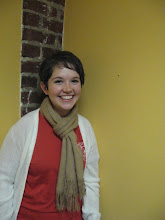
Me with my 6th graders in our classroom.
The year is winding up. Thought I would share a typical day with you. I'm about to head out on our final YAV retreat. Upon return, only one month left!
• Coffee. Breakfast- usually complimented by some delicious fresh fruit (pineapple, papaya, mango, oranges, tangerines, sweet bananas...).
• 7:30 am- morning assembly. The whole school (about 150 of us) classes 1-8 and the nursery school gathers for a short worship service. Singing and dancing to wake us up, a word from the Bible made by the director, and announcements for the day. Exceptions are on Thursdays and Fridays. Thursdays are our music competitions where all the classes compete with their best songs and dances. Fridays we have the Scouts lead us in a processional for the flag raising.
• 8:40-11:10 am- morning classes. On any given day, I teach 6-8 thirty-five minute lessons. I teach English to 5th and 6th graders (though all subjects are also taught in English), C.R.E. (Christian Religious Education) to 4th and 7th graders, and “Creative Arts” (music, drama, visual arts and crafts) to 4th-7th graders. Occaisonally P.E. or whatever else they want to throw my direction.
• 11:10-11:40 am- Teat Time. Religiously observed by both students and teachers. We usually hang out in the teacher’s lounge and drink our tea away from the pupils and argue about some “topic of the day.”
• 1:00-2:00 pm- lunch time. Kids are not picky eaters. They are either served Pilau (a spiced rice, meat and onion combo), Githeri (corn and beans mixed with whatever vegetable is on hand), or Rice and Beans. Sometimes, the national food, Ugali- corn flour and water cooked together to make a sort of solid that definitely sticks with you- eaten with Sukuma Wiki- cooked greens.
• 2:00-4:20 pm- afternoon classes.
• 4:20-5:00 pm- extracurricular activities. Monday and Fridays: Games in the field (usually football/soccer or “net”ball- similar to basketball). Tuesdays: Debate- classes debate a different topic each week for good practice in English. Wednesdays: Christian Union fellowship- a worship service for the whole school. Thursdays: clubs (I sometimes help out with music and drama club or Journalism club). Our biggest and most popular club is the Scouts who usually practice marching at this time.
• 5:00-6:00 pm- day scholars go home to their parents, the boarding pupils grab their buckets to fetch water and take their baths. I usually run to the market to fetch whatever I’m cooking myself for dinner (since it's been cold, I have become the SOUP master- delicious with all the available fresh veggies and spices).
• 6:00-7:00 pm- boarders eat dinner together after a short devotion. I sit on my porch and watch the sunset.
• 7:00-9:30 pm- boarding students attend night preps where they watch the evening news together and then work on their homework. They get extra assistance from their teachers. I sometimes attend these sessions. Otherwise, I’m at home grading papers, planning lessons, cooking…
• 10:00 pm- we call it a day.
The waterfalls in Meru. About a 10 min walk away from my house.



